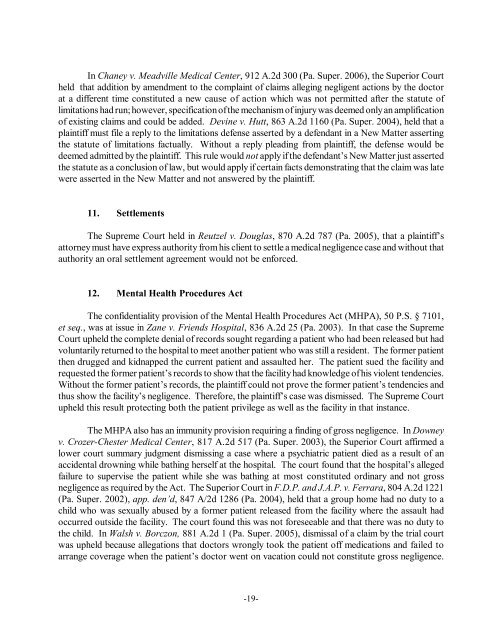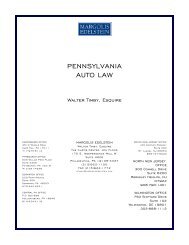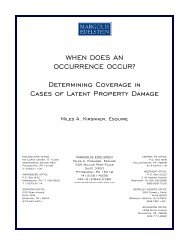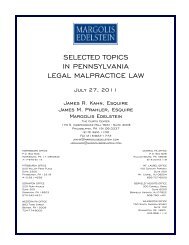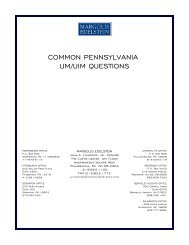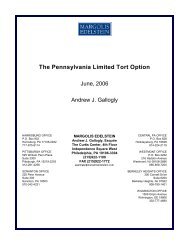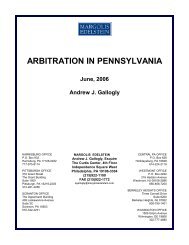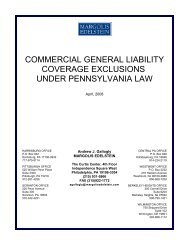recent developments in pennsylvania medical malpractice law
recent developments in pennsylvania medical malpractice law
recent developments in pennsylvania medical malpractice law
Create successful ePaper yourself
Turn your PDF publications into a flip-book with our unique Google optimized e-Paper software.
In Chaney v. Meadville Medical Center, 912 A.2d 300 (Pa. Super. 2006), the Superior Courtheld that addition by amendment to the compla<strong>in</strong>t of claims alleg<strong>in</strong>g negligent actions by the doctorat a different time constituted a new cause of action which was not permitted after the statute oflimitations had run; however, specification of the mechanism of <strong>in</strong>jury was deemed only an amplificationof exist<strong>in</strong>g claims and could be added. Dev<strong>in</strong>e v. Hutt, 863 A.2d 1160 (Pa. Super. 2004), held that apla<strong>in</strong>tiff must file a reply to the limitations defense asserted by a defendant <strong>in</strong> a New Matter assert<strong>in</strong>gthe statute of limitations factually. Without a reply plead<strong>in</strong>g from pla<strong>in</strong>tiff, the defense would bedeemed admitted by the pla<strong>in</strong>tiff. This rule would not apply if the defendant’s New Matter just assertedthe statute as a conclusion of <strong>law</strong>, but would apply if certa<strong>in</strong> facts demonstrat<strong>in</strong>g that the claim was latewere asserted <strong>in</strong> the New Matter and not answered by the pla<strong>in</strong>tiff.11. SettlementsThe Supreme Court held <strong>in</strong> Reutzel v. Douglas, 870 A.2d 787 (Pa. 2005), that a pla<strong>in</strong>tiff’sattorney must have express authority from his client to settle a <strong>medical</strong> negligence case and without thatauthority an oral settlement agreement would not be enforced.12. Mental Health Procedures ActThe confidentiality provision of the Mental Health Procedures Act (MHPA), 50 P.S. § 7101,et seq., was at issue <strong>in</strong> Zane v. Friends Hospital, 836 A.2d 25 (Pa. 2003). In that case the SupremeCourt upheld the complete denial of records sought regard<strong>in</strong>g a patient who had been released but hadvoluntarily returned to the hospital to meet another patient who was still a resident. The former patientthen drugged and kidnapped the current patient and assaulted her. The patient sued the facility andrequested the former patient’s records to show that the facility had knowledge of his violent tendencies.Without the former patient’s records, the pla<strong>in</strong>tiff could not prove the former patient’s tendencies andthus show the facility’s negligence. Therefore, the pla<strong>in</strong>tiff’s case was dismissed. The Supreme Courtupheld this result protect<strong>in</strong>g both the patient privilege as well as the facility <strong>in</strong> that <strong>in</strong>stance.The MHPA also has an immunity provision requir<strong>in</strong>g a f<strong>in</strong>d<strong>in</strong>g of gross negligence. In Downeyv. Crozer-Chester Medical Center, 817 A.2d 517 (Pa. Super. 2003), the Superior Court affirmed alower court summary judgment dismiss<strong>in</strong>g a case where a psychiatric patient died as a result of anaccidental drown<strong>in</strong>g while bath<strong>in</strong>g herself at the hospital. The court found that the hospital’s allegedfailure to supervise the patient while she was bath<strong>in</strong>g at most constituted ord<strong>in</strong>ary and not grossnegligence as required by the Act. The Superior Court <strong>in</strong> F.D.P. and J.A.P. v. Ferrara, 804 A.2d 1221(Pa. Super. 2002), app. den’d, 847 A/2d 1286 (Pa. 2004), held that a group home had no duty to achild who was sexually abused by a former patient released from the facility where the assault hadoccurred outside the facility. The court found this was not foreseeable and that there was no duty tothe child. In Walsh v. Borczon, 881 A.2d 1 (Pa. Super. 2005), dismissal of a claim by the trial courtwas upheld because allegations that doctors wrongly took the patient off medications and failed toarrange coverage when the patient’s doctor went on vacation could not constitute gross negligence.-19-


